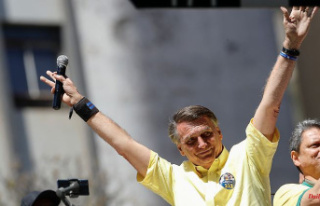The annexation referendum in Crimea in 2014 violated international law, but at least Russia still acted as if it were trying to achieve some semblance of democracy. The sham votes of the Putin regime in the occupied territories no longer look remotely democratic.
For many years, the Putin regime relied on a certain sham legitimacy for its questionable decisions. For example, when the Kremlin did not want to recognize the legitimacy of the Ukrainian government after ex-Ukrainian President Viktor Yanukovych fled to Russia, that was not entirely wrong from a purely legal point of view.
The formal legal background to the removal of the president was not uncontroversial in Ukraine either. However, given the circumstances at the time, Ukraine could do nothing else. Moscow knew this and exploited it rhetorically. As if several elections had not taken place in Ukraine since then, Putin - like last Wednesday - speaks of the "neo-Nazi regime that is said to have seized power in Ukraine in 2014 with an armed coup".
Even during the annexation of Crimea, which undoubtedly violated international law, there were at least functioning polling stations, a large part of the population was willing to participate and electoral commissions that counted votes. It is true that the way the question was asked did not at all allow for a return to the status quo before the start of the occupation of the peninsula by Russia. And the fact that fewer people in Sevastopol are said to have voted in favor of joining Russia than in the rest of Crimea suggests that the result was fictitious. That's hardly possible: Sevastopol, which was also the main base of the Russian Black Sea fleet at the time, is significantly more pro-Russian than other cities on the peninsula. Despite this, support for the annexation was evident, even if Crimean sentiment was different as recently as 2013, heavily influenced by Russian state television.
Officially, at least, Russia wanted nothing to do with the absurd referendums on the "independence" of the so-called People's Republics of Donetsk and Luhansk in May 2014, which hardly anyone took seriously. The direct involvement of Russian forces in the Donbass war, although proven, was not large: it was only about key moments in August 2014 and February 2015.
But at some point Putin's approach changed - it became increasingly irrelevant whether his measures looked democratic. So he organized a constitutional amendment that secured him the presidency for life. The fact that he wanted to continue in power after the end of his term in 2024 was of course clear in the logic of the Russian power apparatus. However, it would also have been possible for Putin to become head of a body such as the Council of State and thus remain more or less within the framework of the existing constitution. Finally, in the 2020 constitutional referendum, individual results were published before the polling stations closed in other parts of the country - so the little things that the Kremlin normally paid attention to were ignored.
The sham referendums in the occupied Ukrainian territories are the current climax of this development. Russia no longer even tries to fool the public into at least a small piece of legitimacy. It would have looked less silly if Russia had dispensed with these "votes" altogether and simply annexed the territories. Quite apart from the fact that Russia is conducting its "referendums" in districts that it has not fully conquered: Zaporizhia Oblast without wanting to annex the city of Zaporizhia - the project would actually be quite funny if the whole situation weren't so sad.
When the first "projections" are published today, everyone knows that, unlike in Crimea, they have no connection to reality. The Kremlin knows that too: According to the Russian exile medium Meduza, Russia conducted a survey in the Cherson and Zaporizhia districts in the summer, which revealed that only 30 percent supported joining Russia. The fact that the number was so small, even given the massive repression to which the residents were and are exposed, actually says it all.
The "results" presented by Russia today will look very different. Already on the second day of the sham referendums, a post-election poll from the Zaporizhia district was published, according to which 93 percent are said to have voted for the annexation. This "election" did not take place in polling stations, but at home: representatives of the "election commissions" came, accompanied by soldiers, to collect votes, which had to be thrown into glass ballot boxes. It doesn't get any more absurd than that.
In March 2014, Putin celebrated his greatest triumph with the annexation of Crimea - knowing full well that the West, despite all the sanctions, could not prevent the peninsula from being annexed to Russia. The annexation of the Ukrainian territories on the fringes of Russian mobilization, on the other hand, is nothing but a desperate attempt to save what can still be saved. Putin will not get very far with this.












